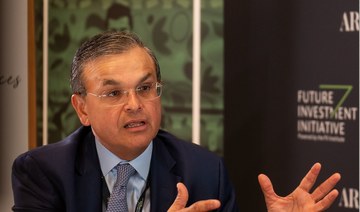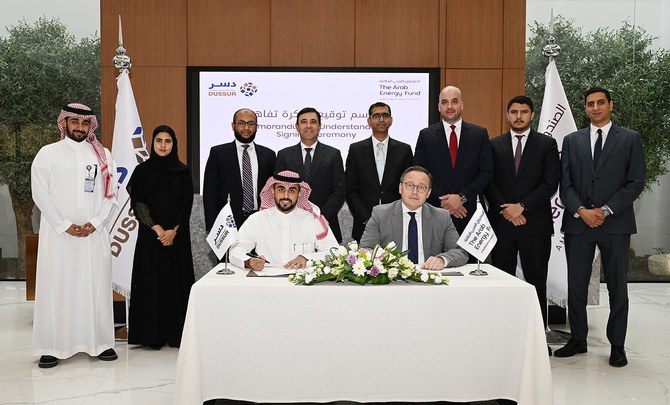RIYADH: Saudi Arabia offers significant growth potential for foreign banks operating in the Kingdom to meet the increasing demand from Chinese clients, according to a senior banker.
Speaking to Arab News, Jerry Zhang, CEO of Standard Chartered Bank China, noted that the company is strengthening its infrastructure and services to better support Chinese clientele in Saudi Arabia, indicating confidence in the market’s potential.
Zhang said: “We are actually hiring a corridor banker. Corridor banker, meaning that a Chinese-speaking local relationship manager is servicing the underlying clients. So, we are hiring additional resources to be stationed in Saudi to serve the Chinese clients here. This is absolutely driven by the demand.”
She added: “We are also beefing up supporting systems and services capabilities to serve Chinese clients here onshore. That’s a straightforward proof of how we see the potential of this market.”
Standard Chartered’s banking presence in the region is relatively new, as it commenced operations in Saudi Arabia in 2022.
However, the corridor between the Middle East and China already contributes 10 percent to the bank’s income and is experiencing rapid growth.
“Hopefully, in 12-24 months’ time, we will see the share of the Middle East corridor within the entire China origination income grow faster, particularly in Saudi Arabia, and I can claim a large share of that and report it to you,” Zhang said.
Additionally, the CEO underlined that Saudi Arabia and China align strategically. The Kingdom is actively seeking diversification in its economy, particularly in sectors like infrastructure, new energy, technology, logistics, and e-commerce. These sectors are recognized as key areas where North Asian companies excel.
“Therefore, I think Chinese companies do have an edge and also an urge to come across to Saudi Arabia to provide their products and services, expanding into this part of the world very fast. In our Standard Chartered’s position, we’ve been consistently transitioning to support the so-called emerging new economy in China for the past eight to 10 years,” Zhang continued.
The CEO underscored that new economy sectors, such as technology and innovation, have experienced significant growth and now contribute nearly 50 percent of the firm’s corporate income.
This transition aligns strategically with both countries’ goals and supports Saudi Arabia’s Vision 2030 by providing services in sectors relevant to its objectives.
Zhang further elaborated on the development of the Chinese economy, highlighting its 5.2 percent growth rate last year, which is considered strong compared to other major economies.
She anticipates a 4.8 percent growth rate for 2024, primarily driven by consumption and growth in these rising industries.
“More than 30 million cars have been produced and sold. For the first time in history, China has exceeded Japan to become the No. 1 exporter of cars worldwide, and for EV (electric vehicle) cars in particular, last year, I think China has produced close to 10 million EVs and more than 30 percent in the penetration ratio,” Zhang said.
Commenting on the relationship between the North Asian country and Saudi Arabia, Zhang said that Standard Chartered China has engaged with the Kingdom’s leadership team and women entrepreneurs in technology, whom they have sponsored and supported through programming.
“First, we saw the bilateral relationship really accelerate after President Xi’s visit. By the end of 2022 and during the investment conference, both sides had signed more than 60 agreements worth more than $25 billion in contracts, which is extremely exciting, and things have been moving even faster from there,” Zhang commented.
She added, “The two central banks have signed a currency swap program worth 50 billion RMB, which will pave a very strong foundation for financial collaboration between the two nations as well... We are seeing this extremely friendly government-to-government relationship that further nurtures the economic ties between the two sides.”
The bank is enhancing its presence by adding more personnel, introducing new products and solutions, and implementing best practices from its global operations in the Kingdom.
Mazen Bunyan, CEO of Standard Chartered Saudi Arabia, emphasized that the Kingdom and China share a historic and long-standing relationship. Additionally, both nations have very similar strategies for achieving their economic growth, diversification, and objectives.
“We have a very unique opportunity and position as a global bank in both markets to leverage on that network, on connectivity. We’re expanding on the market. We’re expanding our operations, and adding people, products and services on the ground, and solutions,” Bunyan told Arab News.
He added: “At the same time, we continue to engage with key stakeholders on each side, China and Saudi Arabia, to smooth the knowledge gap to help the engagement between the two counterparts or two countries.”
Bunyan highlighted that the bank has around 50 employees working directly in the Kingdom, the majority of whom are Saudi nationals. Additionally, a significant number of women leaders are present within the organization’s regional workforce.
“We have also a very huge portion of women leaders within both entities, and we continue to invest in talent in Saudi Arabia and develop them as well in line with the Vision 2030 Human Capital Development Program,” Bunyan said.
Standard Chartered Bank in Saudi Arabia operates as a full-fledged wholesale organization, focusing on serving government and quasi-government financial institutions as well as large and global companies in the Kingdom. The bank’s objective is to deliver value to these clients and support them in achieving their respective objectives and strategic priorities.
The financial institution plays a significant role in facilitating inward business into Saudi Arabia, leveraging its extensive global footprint, particularly in regions like China.
Additionally, Standard Chartered assists international companies in establishing their presence and operations in the Kingdom, serving as a bridge between these companies and the Saudi market.


















